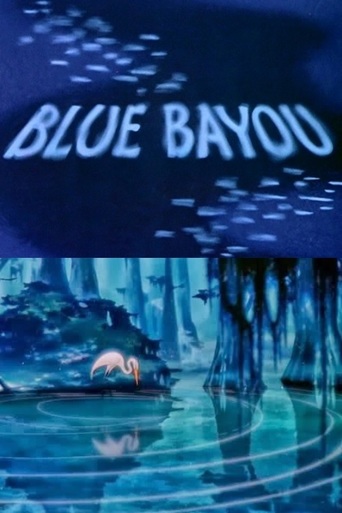utgard14
Originally part of the movie Make Mine Music, this cartoon was released later on its own as a theatrical short. Actually, it was first produced for Fantasia with classical music but was cut and made part of the later film. Here, the music is the song "Blue Bayou" performed by the Ken Darby Singers. It's good but I think the original piece intended for it, "Claire De Lune," works better. There's no story, really. It's just a sort of music video with the song played to a nighttime scene in a swamp. Overall, it's a lovely cartoon with pleasant animation and nice color. Nothing exceptional but enjoyable, particularly for classic Disney fans.
TheLittleSongbird
One of my favourite shorts featured on "Make Mine Music" along with "Willie the Operatic Whale", "All the Cats Join In" and "Peter and the Wolf". There is no dialogue or plot, like "Trees", but it is a tranquil and relaxing watch. I don't know where to begin praising the short.For one thing the animation is gorgeous. The blue backgrounds were pristine and perfect, and the storks's movements were convincing. The music is another high point, complete with sublime vocals, with poetic lyrics and a lyrical and sensual melody.Overall, I loved "Blue Bayou", just wonderful to watch. 10/10 Bethany Cox
Ron Oliver
A Walt Disney Cartoon.A pair of storks find tranquility in the moonlit sanctuary of the BLUE BAYOU.This tiny extract from Disney's MAKE MINE MUSIC (1946) hasn't any dialogue and only the merest whisper of a plot. What it does have is a remarkable feeling of deep, otherworldly peace - a chance for a few moments to find a little rest within the confines of a hectic multi-episode animated film. It also is an excellent example of what Walt's animators were able to achieve with just one primary color.Walt Disney (1901-1966) was always intrigued by drawings. As a lad in Marceline, Missouri, he sketched farm animals on scraps of paper; later, as an ambulance driver in France during the First World War, he drew figures on the sides of his vehicle. Back in Kansas City, along with artist Ub Iwerks, Walt developed a primitive animation studio that provided animated commercials and tiny cartoons for the local movie theaters. Always the innovator, his ALICE IN CARTOONLAND series broke ground in placing a live figure in a cartoon universe. Business reversals sent Disney & Iwerks to Hollywood in 1923, where Walt's older brother Roy became his lifelong business manager & counselor. When a mildly successful series with Oswald The Lucky Rabbit was snatched away by the distributor, the character of Mickey Mouse sprung into Walt's imagination, ensuring Disney's immortality. The happy arrival of sound technology made Mickey's screen debut, STEAMBOAT WILLIE (1928), a tremendous audience success with its use of synchronized music. The SILLY SYMPHONIES soon appeared, and Walt's growing crew of marvelously talented animators were quickly conquering new territory with full color, illusions of depth and radical advancements in personality development, an arena in which Walt's genius was unbeatable. Mickey's feisty, naughty behavior had captured millions of fans, but he was soon to be joined by other animated companions: temperamental Donald Duck, intellectually-challenged Goofy and energetic Pluto. All this was in preparation for Walt's grandest dream - feature length animated films. Against a blizzard of doomsayers, Walt persevered and over the next decades delighted children of all ages with the adventures of Snow White, Pinocchio, Dumbo, Bambi & Peter Pan. Walt never forgot that his fortunes were all started by a mouse, or that simplicity of message and lots of hard work always pay off.
